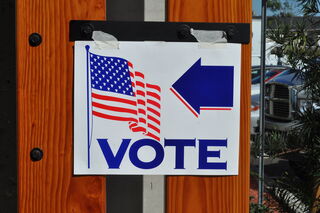
During the days of protests that followed the death of George Floyd at the hands of a Minneapolis policeman, it’s been said by some that if all of the people who had come out to register their disgust at the inhumanity of his killers had cast ballots, the political complexion of the United States might be very different today. Yet some of those condemning racism and police brutality express doubt about the utility of voting. The system is broken, some say, and there’s no changing it from within. But why?
There’s actually a sad congruence between the “broken system” or “my vote won’t change anything” outlook, and the rational choice theory of traditional, pre-behavioral economics (see, for example, Dhillon and Peralta, 2002). This is the old sort of economic theory that assumed people to be selfish and rational: if a state or other jurisdiction has, say, 3 million eligible voters, and if 1 million or more will probably vote, then the chance that your vote will make a difference between your preferred candidate winning and her losing the election is close to zero.
If it requires that you give up even a half an hour of your leisure time to get to the poll and cast a vote, then the expected payoff, calculated as the benefit to you from your candidate’s success times the probability your vote changes the outcome, is unlikely to compensate you for the trouble. It would take either an extraordinary premonition of being the swing voter, or an almost infinite valuation by you of your candidate succeeding, or a large dose of irrationality, to drive you to go and vote.
The argument is correct, in its own selfish and rational terms, but society doesn’t stand or fall based on selfish calculation. For society, the rational selfish logic represents a kind of “fallacy of composition.” The whole here is actually much bigger than the sum of the parts. Government of the people, by the people, and for the people depends on the people stepping up and playing their parts. The “what difference will one vote make” attitude is a recipe for disaster.
Perhaps the people who benefit from low voter turnout would like to keep the “why should I vote, it won’t change anything” meme in circulation. But the old saw about the lottery ticket applies here in spades. You know the one about the guy who gets down on his knees to pray and says “God, won’t you please let me win the lottery?” and God says, “I’m trying to help you here, but would you give me a hand and go buy a lottery ticket?” And now, the good lord is saying to all of those who want a more just world, “I’m trying to get you the laws and policies you need to make your lives better, safer, and fairer, but would you please help me out by going to vote?”
I’m only a behavioral economist, not a psychologist, but let me suggest a way to make voting a bit more of a draw. How about a “vote-in,” or a big public event, like Cairo’s Tahrir Square in 2011, or Kiev’s Orange Revolution in 2004, or Manila’s People’s Power revolution in 1986? These were the sorts of events that drew millions who said to themselves, “This is an event of a lifetime, and I need to be able to tell my grandchildren one day that I was there.” (See also Tina Rosenberg's wonderful description of the Otpor movement that overthrew the dictatorship in Serbia.)
Now, imagine that it’s November 2020. People tried to get your state to expand voting by mail, but your governor or legislature or both were against it. Positive tests for COVID-19 have been rising, as have hospitalizations and deaths, so you’ll have to risk your life to vote, not just sacrifice a half an hour of leisure. But your future grandchildren are waiting to see what stuff you’re made of. Fortunately, there’s a movement afoot. Given that those in control have forced you to choose between your safety and your rights, you’re about to join it. The movement has prepared 30 million head-to-toe hazmat suits, each bearing the large logo “don’t mess with my democracy,” and is giving them out on a street corner at every square quarter-mile in 83 large and mid-sized American cities. People are gathering in long, socially-distanced lines to vote. So what that it took Michael Bloomberg and a couple of other billionaires joining 70,000 smaller donors to get the suits paid for? Put one on.
There’s been considerable discussion of the possibility of an effort to prevent the election from happening or refuse to accept its outcome. I believe that the votes will be counted, the leaders of our military services will not condone a coup against the democratic will of the people, and we’ll have an election that your grandchildren will ask you about. Just do me a favor, please. Make sure that you vote.
References
Amrita Dhillon and Susana Peralta, “Economic Theories of Voter Turnout,” The Economic Journal, 2002.
Tina Rosenberg, Join the Club: How Peer Pressure can Transform the World. Norton, 2012.


